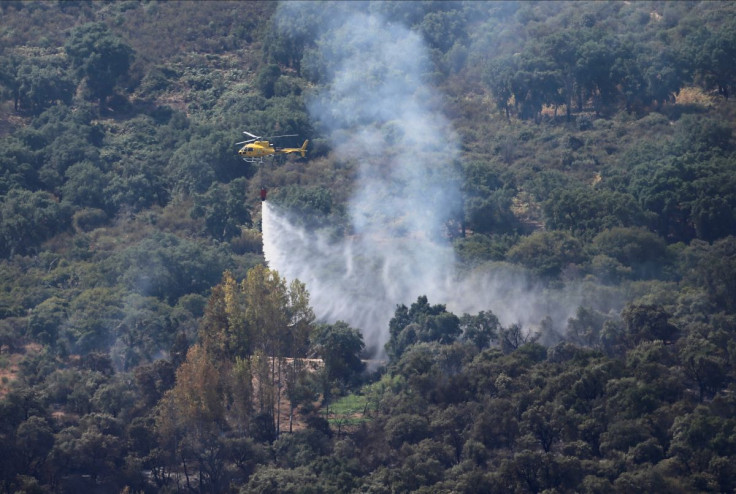France Battles Massive Wildfires, Britain Records Highest Ever Temperature

Firefighters in southwestern France battled on Tuesday to contain massive forest wildfires and Britain recorded its highest ever temperature as a heatwave rising from the south settled over western Europe.
Southern and western Germany and Belgium were also braced for potentially record-breaking temperatures as the heatwave, which scientists attribute to climate change, edged north and east.
A temperature of more than 40C (104F) was provisionally recorded on Tuesday for the first time ever in Britain, the Met Office said.
Authorities have put Britain, which often struggles to maintain key transport services when hit by unexpected weather such as heavy snow or high winds, on a state of "national emergency" over the unprecedented temperatures.
Transport minister Grant Shapps said it would take many years to fully upgrade Britain's infrastructure to cope with higher temperatures, after at least two airport runways showed signs of damage and some train tracks buckled.
"We've seen a considerable amount of travel disruption," he told the BBC. "Infrastructure, much of which was built from the Victorian times, just wasn't built to withstand this type of temperature."
In southwestern France, the wine-growing Gironde region saw its biggest wildfires in over 30 years and authorities said a man had been detained on suspicion of arson.
The fires have spread across 19,300 hectares (about 75 sq miles) in the countryside surrounding Bordeaux since July 12, forcing a total of 34,000 people to evacuate their homes.
About 2,000 firefighters, supported by eight water-bomber aircraft, were battling the blazes.
"Despite attacks from the ground and from the air, the situation has still not stabilised," the state prefecture said in a statement, adding there had been no reports of death or injury.
A study published by climate scientists in June in the journal "Environmental Research: Climate" concluded it was highly probable that climate change was making heatwaves worse.
With human-caused climate change triggering droughts, the number of extreme wildfires is expected to increase 30% within the next 28 years, according to a February 2022 U.N. report.
"We are seeing more frequent heat waves, and the heat waves are hotter than they would have been without climate change," Friederike Otto, Senior Lecturer in Climate Science at Imperial College London, told Reuters.
FLAMES AND SMOKE
Although the mercury dipped back towards more normal summer levels in Spain and Portugal, firefighters in both countries were still battling multiple blazes.
More than 30 wildfires continued to ravage parts of Spain, with authorities paying special attention to four blazes in Castile and Leon and Galicia.
In Losacio, in northwestern Zamora province, where two people have died and three critically injured, more than 6,000 people in 32 villages have been evacuated.
Dramatic TV footage showed flames and plumes of smoke billowing into the night sky near the Zamora town of Tabara.
On Monday, a man trying to protect his town from wildfire had a close brush with death when the blaze engulfed his digger, forcing him to run for his life while patting out flames on his clothes.
In Galicia, more than 1,500 people have been evacuated from the path of four fires, which damaged several buildings.
So far this year 70,000 hectares (173,000 acres) have been burned in Spain, around twice the average of the last decade, official data showed before the heatwave.
In neighbouring Portugal, around 50 municipalities, mainly in central and northern regions, still faced "maximum risk" of wildfires, according to the IPMA weather institute.
More than 1,000 firefighters were battling five main wildfires, the biggest of which started in the northern municipality of Mur?a and spread to two nearby municipalities.
Hundreds of people have been evacuated from villages and an elderly couple was found dead on Monday inside a burned-out car.
In Greece, firefighters tackled 73 fires within 24 hours, the fire brigade said on Monday. The civil protection authority has warned of a very high risk of fires across the country on Tuesday.
A wildfire that began in Slovenia's Karst region had been contained by firefighters on Tuesday, authorities said, two days after the blaze began. There were no casualties.
© Copyright Thomson Reuters 2024. All rights reserved.











